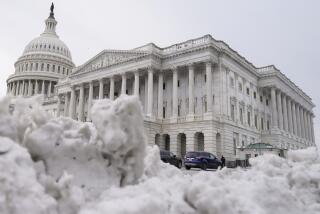Obama signs bill to extend jobless benefits
Reporting from Washington — President Obama signed legislation extending unemployment benefits Thursday for 2.5 million jobless Americans, a hard-fought achievement his party will use to portray Republicans as callous to the needs of ordinary workers in a fall election campaign tied to the country’s economic fate.
But Democrats continued to struggle over the next steps to improve the economy, confronting a 9.5% national jobless rate and voters who are demanding jobs and paychecks, not just unemployment checks.
After this week’s victory on unemployment, Democrats still must decide whether to allow George W. Bush-era tax breaks for wealthy Americans to expire at the end of 2010 — a step Republicans say would represent the largest tax hike in recent history.
Obama signed the unemployment bill into law just hours after congressional passage and then urged lawmakers to move swiftly to their next orders of business.
“Now it’s time for Congress to act on more proposals that support our economic recovery, including passing critical aid to our states and support to small businesses,” Obama said, saying passage of tax and lending measures “should not be held hostage to partisan tactics.”
The House voted 272 to 152 earlier in the day to extend unemployment insurance through November for those who have not exhausted up to 99 weeks of aid. The payments are retroactive to late May.
The California Employment Development Department immediately announced that it would begin processing retroactive benefits for more than 400,000 unemployed people. State workers will be on duty throughout the weekend to issue checks to eligible claimants.
“We understand how critical these benefits are to workers and their families who have suffered long bouts of unemployment in this recession,” said Pam Harris, EDD’s chief deputy director.
Republicans had stalled the $33.9-billion package for weeks, arguing that aid should be paid by making cuts elsewhere. Democrats have maintained that jobless benefits represent emergency spending that is not traditionally offset with cuts.
While Republicans sought to burnish their credentials as fiscal hawks, Democrats warned that GOP control of the House would spell a return to tax breaks and other policies of the Bush administration that contributed to the growth of the federal deficit.
House Speaker Nancy Pelosi (D- San Francisco) recalled that Republicans not only stalled jobless aid, but also blocked the healthcare overhaul and Wall Street restructuring while promoting an extension of the Bush tax cuts “for the wealthiest people in America.”
Many economists have concluded that unemployment benefits not only provide laid-off Americans with vital cash to pay bills, but also offer an important, if modest, boost to a still fragile economy.
Hiring remains slow as companies are reluctant to invest. And despite months of economic growth, the nation has not begun to generate enough jobs on a monthly basis to lower the unemployment rate.
Federal Reserve Chairman Ben S. Bernanke testified before Congress this week that the unemployment rate is expected to remain higher than normal for the next several years.
Against this backdrop, Democrats on Thursday pressed an agenda of manufacturing and small-business incentives that experts say would provide only modest relief.
“They want to appear like they’re doing something, but what they are doing — while not harmful and maybe beneficial [is] not likely to have a significant effect on the economy and job creation over the next three, six or 12 months,” said Sherle Schwenninger, director of the economic growth program at the New America Foundation, a think tank.
Times staff writer Marc Lifsher in Sacramento contributed to this report.
More to Read
Get the L.A. Times Politics newsletter
Deeply reported insights into legislation, politics and policy from Sacramento, Washington and beyond. In your inbox three times per week.
You may occasionally receive promotional content from the Los Angeles Times.











